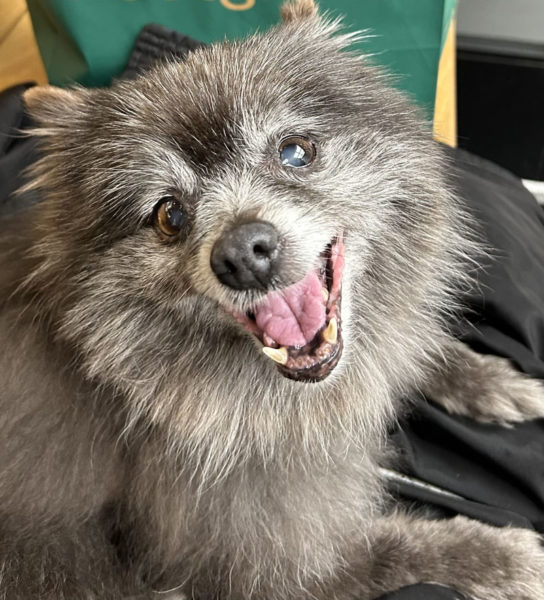
Hedgehog (Molly Rains photo)
Typically, I work on articles while listening not to calming music or white noise but, rather, to the sound of snoring: a rumbling, wheezing, near-incessant snoring that emanates from my 17-year-old, eight-pound Pomeranian, Hedgehog.
Hedgehog is sleepy. She snores for what seems like 23 hours each day. But I don’t begrudge her the rest. According to an American Kennel Club formula, at 17, she’s about 84 in Pomeranian-years. Holding on for this long, I think, has earned her all the lazy days she wants.
Hedgehog hasn’t had an easy life, but what exactly she’s experienced I will never know. I adopted her just about three months ago now from Midcoast Humane, where there was little information available about her past.
On the morning we met, Hedgehog had been waiting in the shelter for months. A volunteer carried her out from the kennels in his arms and left us to get acquainted. Hedgehog’s coat was thin and patchy, rescuers having shaved her to rid her of the mats and fleas that she had been covered with upon arrival, and she stood trembling from cold and fear. I wrapped her in my coat and knew that I would take her home.
Age is one of the factors that most influences the length of time that an animal will remain in a shelter once surrendered. A 2018 study in the journal “Animals” confirmed that senior pets wait significantly longer than their peers to find loving homes as they are repeatedly passed over for younger animals.
This is despite the fact that pets of all ages are surrendered to shelters for a vast range of reasons — from abuse or neglect to financial struggles or even the death of a loving owner, things happen to animals of all ages that leave them waiting for a second chance.
Adopting a senior pet isn’t for everyone. Like every phase of life, old age comes with its own set of challenges. But, at the same time, senior pets come with their own particular charms, including generally calmer dispositions and a convenient tendency to already be housebroken.
Maybe another reason that senior pets so often go unclaimed is our desire to love our pets — and to put off the grief of losing them — for as long as possible.
When I adopted Hedgehog I thought I could evade that grief with logic. I will be grateful for any time we have together, not sorry for how little there may be, I told my mother when she warned me that this choice would not be easy.
Of course, after only a few hours of knowing Hedgehog, I realized that there were holes in that plan. Grief isn’t scalable. But the same is true of love, and the amount of joy that Hedgehog has brought me and those she meets certainly isn’t lessened by the fact that her time with us is limited.
Living day-to-day with Hedgehog, I often forget that she is an old lady. When awake, she’s spunky, energetic, and loving. She eats voraciously (only wet food, as she has about four teeth), bounds through the forest on our walks, and follows me around like a shadow when we’re back inside.
Then, she falls right back to sleep, as she is now, snoring beside me as I write.
I’m grateful for her wheezes, and grateful that this bow-legged, cloudy-eyed dog found her way into my life. For however long our lives intersect, I will be better for it.
(“Paper Pets” spotlights the animal companions of Lincoln County News employees.)






